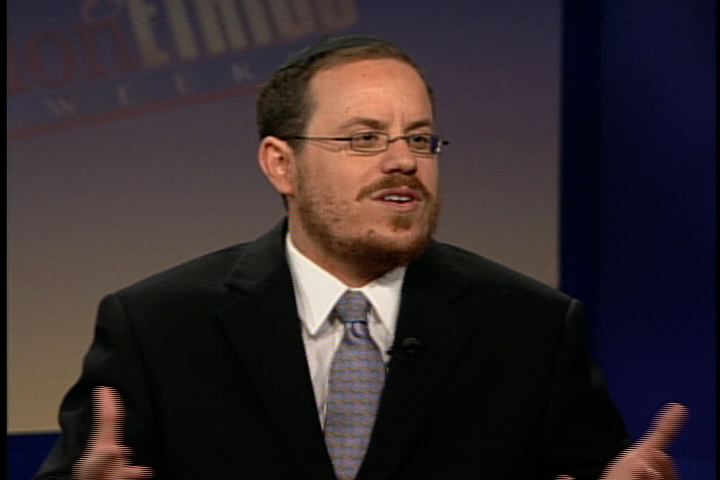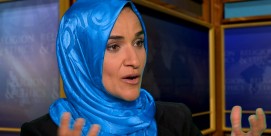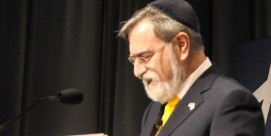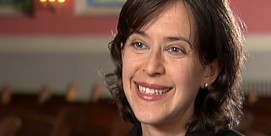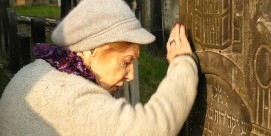In This Episode << SLIDE LEFT TO SEE ADDITIONAL SEGMENTS
Religion and Hate Crimes
BOB ABERNETHY, anchor: An 88-year-old white supremacist known for his hatred of Jews and African Americans shot and killed a security guard this week (June 10) at the US Holocaust Memorial Museum in Washington. Jewish, Muslim, Catholic and Protestant groups quickly denounced the attacks, and the next day leaders of many faiths held a vigil outside the museum pledging a new commitment to fighting bigotry and injustice. One of those at the vigil was Rabbi Shmuel Herzfeld of Ohev Sholom, the oldest Orthodox synagogue in Washington, DC.
Rabbi, welcome. How do you explain to yourself and to your children and to your congregation what happened at the museum?
Rabbi SHMUEL HERZFELD (Ohev Sholom, Washington, D.C.): Well, sometimes there are acts that have no explanation, that are so difficult to understand. But we have to try to explain. I myself was just shocked. When I heard about it I was devastated, but I thought I could keep this from my children. And we have five children — we’re blessed by God — and the oldest is nine. And we were sitting at the table last night, and I thought they didn’t know about it, and one of my children said, “Oh yeah, we know about the shooting.” And my jaw dropped open. And they wanted to know how something like this could happen. You know, I had been trying to protect my kids from hearing about this. I thought maybe we could keep them from knowing.
ABERNETHY: And what did you tell them?
Rabbi HERZFELD: Well, I said to them sometimes there are just people who are wicked. You know, like sometimes you’ll see a kid in school who’s just being mean for no reason. Well, if we multiple that by so much, there’s some people who are so wicked in the world and there’s no way to understand it. But that means we have a job to do, and our job, I said to my children, is to reach out and be extra nice to people — especially people whom we don’t know, especially people who are different. That’s a message that kids can understand, and in the face of somebody who acts with senseless brutality and evil we have to be the opposite of such a person. We have to double-down on kindness.
ABERNETHY: Do you see this as an isolated incident, or do you fear that it’s part of something larger?
Rabbi HERZFELD: Well, there’s always the fear that this is part of something larger, and I’m very afraid that this is part of something larger. In the last few weeks we’ve seen an attack on Wesleyan University where the killer had written he wants to kill Jews. We saw two synagogues nearly blown up in a plot in Bronx-Riverdale, New York, where I was a rabbi for five years. We see high unemployment, both in America and even higher in Europe, and there’s the fear of social unrest. So this is real cause for concern. I mean, ever since 9/11 we’re very concerned in this country especially when you see what one person — the damage one person could have done if he could have gotten through that security guard. There were 2,000 children in that museum that day. Imagine the horror that could have been inflicted. So that reminds us that we have to act with even greater responsibility to combat this, and the real way to combat this is through education, through reaching out across communities, across religions, and giving the message that even though we’re different, even though we worship differently, even though we might look differently and talk differently, we’re all children of God. This is the common message, that God created man in His image, and therefore no matter what religion you are, you are a child of God.
ABERNETHY: Some people might say, well, in addition to all that we should do something about hate speech, especially on the Internet, where there were some very, very hateful things apparently connected with the shooter. So what about that?
Rabbi HERZFELD: Well, I don’t think that works. I don’t think you can censor people. First of all, I don’t think we should do it, and I don’t think it will work even if we try to do it. I think the answer is we should do something about “love speech,” meaning we should spread words of love in the world, change the dialogue, change the discourse. Instead of reacting with hatred to people, we should reach out and as a community we should cross bridges and make these common connections. When I went to the vigil at the museum I was very touched that people from the Muslim community and the Christian community came there to stand as one with this attack, because this attack was an attack upon a guard on the museum. But the person that was killed was not Jewish, and when a person comes with senseless acts of hate, the bullet knows no name.
ABERNETHY: Rabbi Herzfeld, many thanks.

